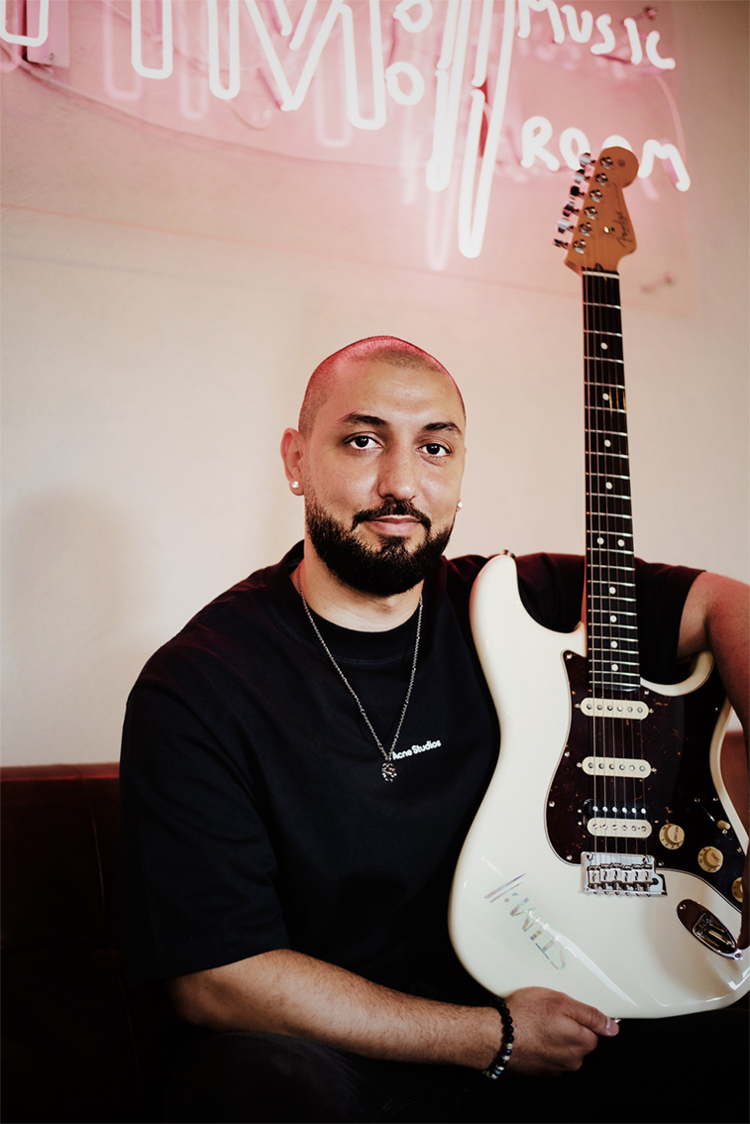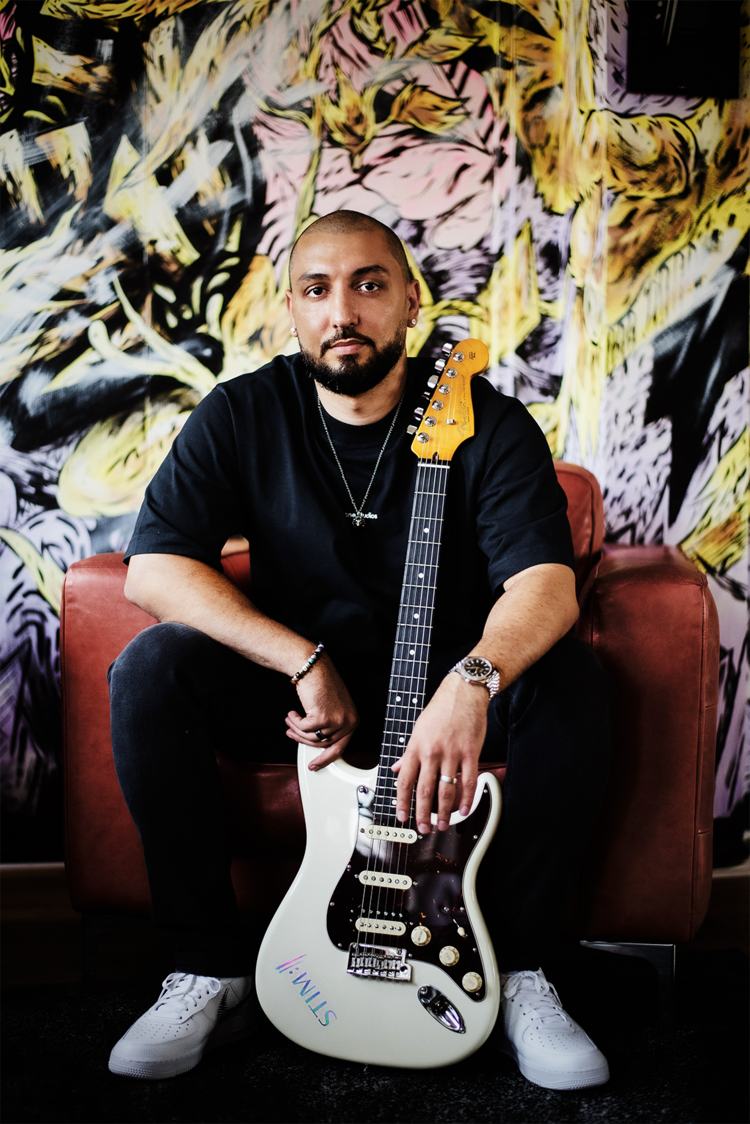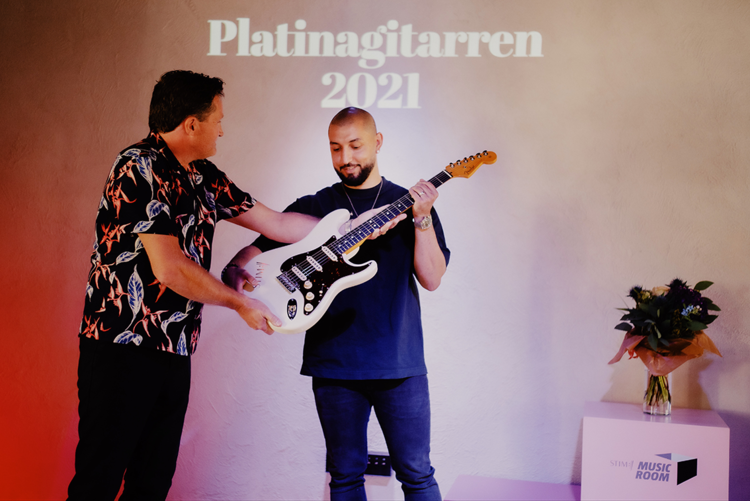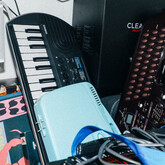Congratulations on the reward!
– Thank you so much.
You are now joining Benny Andersson, Robyn, Veronica Maggio, Per Gessle, Max Martin as one of the musical giants. How does it feel to join these guys?
– Unreal. It’s totally unrealistic. It’s so much fun, really.
What’s exciting about you is that almost everyone has heard your music, but only a handful really knows who you are. Let’s start from the beginning; where are you from and where did you grow up?
– I was born in Iran but we moved to Denmark when I was three years old. We lived there until I was eleven when we moved to Stockholm, Kallhäll. That’s where I grew up, and I stayed there for many years.
When did you get into music? Do you remember the first music you heard growing up, that you really liked?
– Yes, it’s a song I still listen to today – every day. Tracy Chapman with Crossroads.
Wow.
– That’s my very first music memory. My dad loved music, he had all kinds of music – rock, pop, persian. The record’s named Crossroads, and I get happy when I listen to it. It reminds me of my childhood. I think I’ve always been interested in music. I remember standing and listening to all sorts of music and dancing to it. A lot of M.J and that kind of music. My dad liked music, he both played and sang.
Crossroads with Tracy Chapman, what kind of song is it? Can you describe it? I’ve heard Fast Car.
– Yes, Fast Car is the big hit. It’s kind of folk soul, but it’s hard to explain. Folk with a little bit of soul I would say.
And you’re still listening to it every day? Do you have some sort of ritual, in headphones or in the studio – in what way are you listening to it daily?
– In the mornings usually, when I’m getting ready for a new day. It’s on heavy rotation. It makes me feel good – that’s how I like to start my days.
When was the first time you realised you wanted to make music?
– A friend of mine had this program, called Magic Music Maker. I got a demo of him with different loops you could put together. That’s where my interest growed. A friend and I started DJ and we called ourselves The White Tigers – I loved tigers. I was really into them at the time, the white tigers of Siberia and all that. The music was shit, but the name was cool. That's when I got into creating and making music.There was this program called eJay, I think it's Swedish, where you got free demos in Kellogg’s boxes.
In a cereal box? Unbelievable.
– Yes, first I tried hip hop but I didn’t like it. I was listening to a lot of hip hop at the time, and the samples didn’t really add up to what it was. Then there was Dance eJay, I hadn’t really listened to Dance before – it was always hip hop, R'n'B and M.J. I didn’t know that much about dance music at the time, but I thought the sounds were cool and it kind of growed on me – this is what I wanna do.
How old were you at the time?
– Eleven.
So it was all about headphones in your bedroom?
– Yes, kind of. My dad worked with IT, so we had three computers next to each other, so I had one of them.
Do you play any instruments, or is it just the computer for you?
– I borrowed a synth from a friend in the same building over the summer. I wanted to play my own stuff, a lot because of my dad who also plays. So I spent the whole summer learning tones and gained some understanding on how to play. If I hear a song I can take the melody out and so on. That’s where the vocals started to come too. But It all started with the keyboard.
You’ve really learned from scratch!
– Yes, and back then Youtube didn’t exist. You can learn everything there nowadays! Back then it was trial and error. The first time I recorded was on this big screen with a mic on it, so I had to stand really close and I felt how bad it sounded. Then I got an actual microphone and I felt like why does it sound so bad?

You thought you were a singing bird but not really?
– Yes, and how the actual tones sounded like. I knew nothing about EQ or compressors or mixing. I thought as long as you had a nice mic it would sound awesome. So I had to learn that way.
Let’s skip forward a bit. The first time your name shows up is 2008, with Darin and David Lindgren. I guess that’s a long story – but how did you go from writing and playing in your bedroom to start making music with those two?
– I did a lot of hip hop music in school, I sang and wrote the choruses and they rapped. I recorded friends that rapped, so that’s where I got into recording and producing others. I was on this radio show, Power...
They play a lot of R'n'B and hip hop, right?
– That’s right. They had some kind of song competition and a friend from school was like why don’t you join? First you got selected for the show, where there was a battle, where people could call in and vote – then you got to the next round, and the next and so on. I got to the final and was invited to the radio station for a live performance. There was this producer, named Ari, who heard me on the radio, I think he was drunk at the time at 7-Eleven – I was singing a Mario Winans song and he was thinking did they release this acapella? Once he realised it was a competition he called the show and asked for my number, but he didn't get it since I was still in the competition. He went to the studio still wondering who I was, like he was really, really good. Do you remember the guy I borrowed the synth from? His brother is a producer and they share the same studio. So when he told him what he heard on the radio, he was like wait a minute, I think that's my brother's friend! So that’s how I got a meeting with Ari and got into the studio life, writing music and producing. Then I got signed by Warner/Chappell Music.
And you’re still at Chappell Music, right?
– Yes, partly.
You must have been a pretty good singer – and that part of you is not known to a lot of people, I’m guessing?
– I’m not that good anymore – singing is like going to the gym and I haven’t really maintained mine. I can sing today, but I've been better.
It’s interesting, when I think about producing I really think that the work behind it, is very hands on with buttons and stuff – but many have, like Max Martin and Shellback – started out in a band as a singer! To be a singer seems to be a pretty good concept for a producer and songwriter.
– It’s very useful, especially if you’re gonna produce an artist. It’s much easier to convey an expression if something doesn’t sound right, or to explain a certain melody, like sing like this, take this note. You don’t have to be a good singer, but it helps a lot. Especially if there’s a technical thing, like a glide – you can just sing or make the sounds you want, instead of playing it on the piano. So that’s really helpful actually.
Did you win the competition?
– No, lucky I didn’t! Then I would have been signed somewhere else. Everything happens for a reason.
Did you go by the name Ilya, or did you have an artist name?
– No, just Ilya. I had a producer name once – Knock Down – an hommage to the martial arts part of me, but it didn’t stick for long. So now it’s just Ilya. It was actually Shellback who said Why don’t you just go with Ilya – it’s much better.
Your interest in martial arts side –- what’s that about?
– Now I’m boxing with my personal trainer. I can’t go to a club, I’m too competitive and would get too into it. I trained karate for a long time, but I quit right before my black belt. So I can’t really brag about it.
That’s a pretty long way though.
– Yes, I have a third degree brown belt. I did some thai boxing for a while too with a competitive group for Stockholm – Muay Thai – but I never competed. I wanted to become an artist and I was afraid that a crooked nose wouldn't get me there. I think that martial arts has helped me a lot mentally.
To maintain focus, and to go that extra mile, I’m guessing.
– Yes, and the competitive side. The will to show – everyone from "the hoods” would know – that you want to show the society that you’re good enough and that you can. I have the martial arts to thank a lot for.
Have you ever experienced, coming from "the hoods”, not having a Swedish name – that people see you differently, and to be underestimated?
– One hundred percent. That’s how I grew up.
Can you take that feeling now, and reverse it into positive energy?
– That’s what I’m doing every day. Every day.
About the martial arts ... You’re currently working from L.A, where Max Martin has built a studio complex with old houses where Marylin Monroe and Frank Sinatra once lived – there’s some kind of garden there where I met you once, and you mentioned something about energy stones. What are energy stones? Does it have anything to do with martial arts and oriental culture?
– It’s not connected to martial arts, but a lot of it comes from Feng Shui. It’s energy stones that create a certain kind of energy. I have some stones here, I’m not really sure what kind of energy they represent – you can ask my mom about it, she’s really into it. We have stones in L.A all over, that emit positive energy, always positive energy: power, health, wealth and happiness. You can see these small pink stones laying around, with only positive vibes and you can really feel it.
So your mom picked just this set of stones for you?
– Yes, she gets me a new set once every year. She said This year you're gonna wear these stones.
How nice!
– Yes, so that’s where I’ve got it from – my mom. That’s why I noticed the stones in L.A too, I got it from my mom. Not everyone notices them.
You ended up in a studio with Darin and David Lindgren, which led to the Max Martin sphere where you made the first Ariana Grande songs; Problem and Bang Bang, which are amazing songs, that kind of made her breakthrough as an artist. Can you tell me about that process – how did you end up in a studio with her?
– It started as a friendship with Shellback, we hung out and he knows Julius ...
Julius who’s you A&R, and who also knows Max Martin and Johan Shellback?
– He was at Warner/Chappell at the time, where I was in the studio with a couple of others. Johan used to visit Julius and we all started to hang out, we played a lot of Fifa. I liked him a lot and didn’t want to play anything for him, I didn’t want to be that kind of person who takes advantage of the situation. And one day he asked What are you working on? We played it and he liked it a lot, it was just ideas. He talked to Martin and one thing led to another – they decided to release something called Wolf Cousins. It was pure magic.
It’s sort of a team with young, promising producers on Roslagsgatan, Stockholm. Where the Wolf Cousins are the cousins in Bamse...
– Yeah, and Shellback is Skalman.
– That’s kind of like a fun connection. I think the first release was Problem. At that point I’d started working with Savan Kotecha remotely, and he mentioned Ariana. She was already famous due to Nickelodeon in the states, but she hadn’t had her big breakthrough yet. She had a hit called The Way, and I loved it since it had a lot of R'n'B. I thought it was fun to mix R'n'B with pop. So we had a run there with Problem, Bang Bang and One last time.
About Problem, I know that Shavan Kotecha was the co-producer ... All of you were Sswedes in this production, but he has a Swedish wife, while he’s Indian/American – that’s his connection to the Swedish community. He has said that they tried with different producers but no one managed to set the drums – then you got it and you nailed it in twenty minutes!
– What happened was, he had this idea that he wanted recorded on his phone, from an airplane or something. And he had tried it out with other producers and acts – but no one nailed the idea and vision of the song. He told me about it, so I recorded him to have my own voiceover, and then he sang the verse – almost as it is today, but with a really shitty pre – and the chorus too. So I had all of it recorded and just started producing from that. He thought it was dope. Then Martin came in and we finished it together.
You’ve worked with a lot of artists at top level, but Ariana Grande is the one you’ve been working with the most, for over 20 songs. How is it to work with her? Do you have a certain process?
– The transition she’s had since we started working, both as a person and a songwriter, as an artist, she produces herself and prefers that, she can do it all – that transition has been completely amazing. What’s cool about her is that she’s real. She does whatever she feels like. Our cooperation ... We have mostly experimented there. A few times it has turned out really bad, other times we haven’t finished. She is very open to try new things – and that’s the reason we’ve made all kinds of music. She is so unbelievably, unbelievably talented – I saw it there and then; she will be an icon.
Do you book like a session together a Tuesday between 3pm and 20pm, or how does it work?
– It varies. With Ariana it’s always been pretty organized. Sometimes she can call and say she’s dropping by the studio, but usually we book one or two weeks at a time. So it can vary, but it’s never late sessions. I don’t like to only have one or two days, I prefer a week or so. Sometimes you crack the code on Friday, then you want those extra days.

A lot of songs you produce, especially pop and RnB, you work together in a team. Usually 5–6 songwriters. How does that work for you – how do you work together like that?
– It’s kind of hard to make decisions from time to time, that process is a bit longer. When you’re in a team and energy occurs, again with the Feng Shui, you create an energy in the room. You might say something that triggers me to come up with something. That would never happen if I’m working alone. That’s what makes it so important, at least for me – everyone contributes to something. I’m writing music, texts and melodies too – but it depends on who’s in the room. If I'm sitting with Martin and Savan I might back away and just focus on the actual music.
Is that because the two of them are focusing on the melodys?
– They are so active there. If I hear something really clear then I comment on it. But usually I just let them do their thing. In another room I can be more active in the melodies, I can take that role too. I love the teamwork. That’s the best thing for me. I’d rather stand there with a dope song with my friends, than alone.
Does it ever occur any discussions about who made the biggest part of a song?
– That usually happens when you work with people outside your group. Everyone has been through things in their life, some of them horrible things – which can make them act different when it comes to the split. Within the group, where we know each other – I might make 90 percent of the song one day, another day you might. But we always split equally. If we get stuck, and we can’t get a certain part to work, we bring someone in to help. Then there's usually not an equal split between us.
Someone comes in and just solves the problem?
– Yes, like that. It’s more of a friendly discussion.
When you're in the process of making a song, do you understand whether it’s going to be a hit? Can you realise that during the process?
– I don’t know about hit, you never know there. But do I feel something when I hear this song? Sometimes you make music where you want to feel something, but deep down you know that you don’t really like this. Then you know something is wrong. But when you feel it when you’re playing the song, that you really love it and you get that energy from the people that you play it for – then it has something! I’ve never said this is a hit. At least I would never know. But if I feel something for it – absolutely.

Is there anything in particular, and I’m guessing this is a hard question, in the song that makes it stand out? Like Tracy Chapman for instance. What is it about it?
– First – I think at least – many people are focusing on the lyrics, but it’s the melody that’s important – that you get pulled into it. I’m always listening to the melody first hand, but we’re all different there. And if I’m interested – then I’m starting to listen to the lyrics. The melody is the most important. It’s crucial to create some kind of interest from the very beginning. Wow, what’s that? And to mix it up to something unexpected. Sometimes, when you listen to a lot of music, you can almost figure out that that tone is hitting there, or here comes the drop. You need to create, in some nice way, a moment in the song that’s totally unexpected – that’s really important too. It varies, but the feeling is the most crucial thing. Does it come from the heart? Is it real? That’s what's most important.
To create that feeling, it doesn’t mean it has to be perfect in that sense. It can be something that doesn’t make it perfect. You showed me earlier, when you snap your fingers … Can you show me again?
– I hope it turns out good.
The bracelet rattles a bit. What I understand is, there are artists that have used just that sound because they love it.
– Yes, when we were making the Trolls album with Justin Timberlake, we did a lot of these things. He loved when we played around with drums and the bracelet made this sound – so we actually used it in the songs. I love banging on things, you can almost tell in most songs.
Then you might just, even if you don’t really understand it, feel that it’s a human being that’s behind it. It can be very digital otherwise.
– Yes, you can almost hear it ... or you feel when it’s almost too perfect. You don’t wanna end up there. It has to have something organic, even if you’re making electronic music – or any kind of music – it has to be something that’s not right. Or else it's too perfect.
A lot of Swedes want to work with Beyonce – but you’re the only one who actually has! Can you tell more about that, and about the Spirit project?
– Yes, that was very surreal – the connection to The Lion King. My dad has passed, and the first movie we went to see was the original Lion King. So that was kind of a beautiful moment for me. Our teams had been in contact and were like Let’s try something with Ilya, Labyrinth and Beyoncé and liked the idea about it. It all started with me and Lab at the piano making a simple idea. It was’s not supposed to be done or finished, we wanted to create a feeling. We knew it was gonna be for the new Lion King, so we did a rough draft. That’s what’s cool about her, you can send her these roughs – she will know instantly if there’s something for her or not – it doesn't have to be final or perfect. We got a reply from her the same day saying I love it, i wanna work on this. She’s never in the room with you, she’s working a lot on her own with her engineer – but we got notes everyday. Like try this out or why not something like this – very creative ideas!
So she would send you emails with her singing or?
– Texts saying the text could be something like this. The whole intro was her idea, that we should do something majestic with an african chant. It’s actually me singing it now.
Is it you that’s singing in the recording now?
– Yes, I did it just to show sort of like it could be. But that part, it came just at the last minute, the last second. We had another intro in the beginning, with Lab playing the piano. But just the last second before the release, she wanted to change it. I recorded it real quick and we ended up keeping it –- there was no time to call in a real singer. I made sure it was the right swahili and to sing it as close to perfect as I could. It was a lot of stuff like that, very creative ideas andbut a lot of fun. It was a very hectic time, my wife was pregnant at the time so my head was like blurry during the whole process, but it was so much fun.
And the response was incredible, it was nominated in a lot of music awards. The Grammys …
– That’s right, the Golden Globes.
You’re not in the spotlight like that, you’ve not seen out that much – do you go to these galas?
– Yes, I’ve been to a few of them. The Golden Globe twice, which is totally unreal! There are all these people you’ve seen in the movies, just running around. So I’m just running around like a maniac but no one knows who I am, it’s strange. I’ve been to the Grammys too, which I enjoy. It’s special, you get to see your idols perform in front of you. The feeling is surreal, but it’s incredible.
You’ve been at it, at an elite level, for about 15 years now. What about the future, how do you want to continue your work?
– That’s a good question. It feels like I’m only at the beginning ... That could be the martial arts part of me speaking. I want to continue to develop and improve myself. I really want to get good at playing –- for real, I can fake it now. I want to learn new things all the time, that’s my goal in life. Maybe find someone I can sign, but that’s further ahead –- I'm not there yet. At this point I just wanna get better, and compete with myself every day. It feels like I’ve only just begun.

